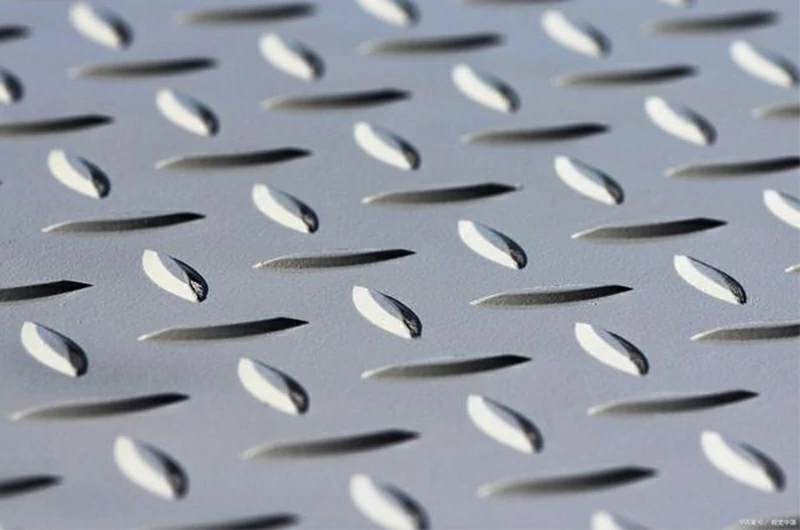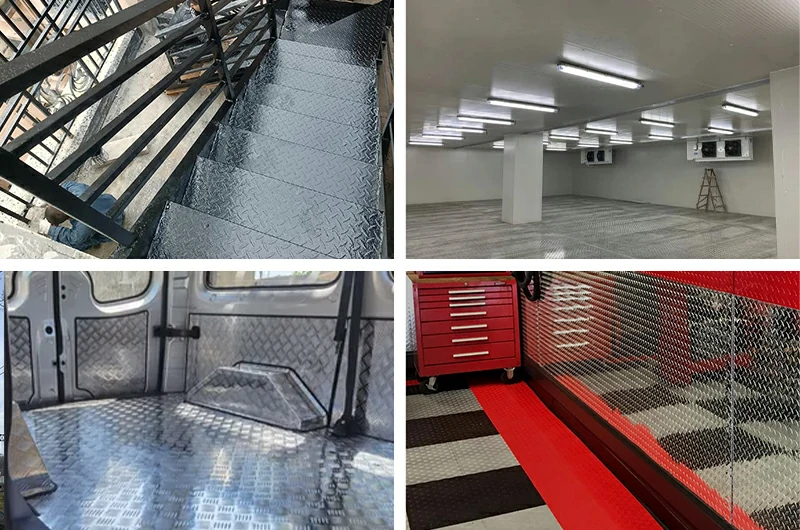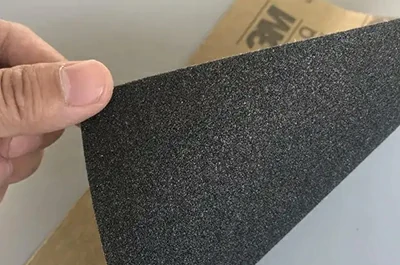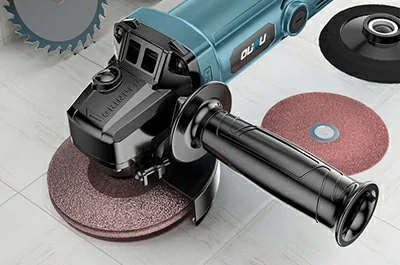In today's architecture and design, aluminum patterned plates are highly prized for their unique appearance and versatility. From flooring to vehicle footboards, they find application in various settings, showcasing their broad utility. However, with use, these plates gradually accumulate dirt, detracting from their appeal and functionality.
Hence, maintaining clean aluminum patterned plates is crucial. We'll share simple, effective cleaning methods to ensure your plates remain smooth and durable. Additionally, we'll introduce polishing techniques, including manual and power tool options, to repair and restore the surface, prolonging their lifespan.

The charm of aluminum checker diamond sheets
Aluminum patterned sheets are highly favored for their distinctive appearance and versatility, finding widespread applications across various domains:
- Flooring: Aluminum grid sheets are extensively used in industrial and commercial flooring, such as factories, warehouses, kitchens, and restaurants. Their non-slip surface performs well both indoors and outdoors.
- Step treads: Aluminum patterned sheets are commonly used in manufacturing step treads, providing traction for stairs, ladders, and similar surfaces.
- Ramps and walkways: Grid aluminum sheets are prevalent in industrial and commercial environments for ramps and walkways, capable of withstanding heavy traffic and harsh weather conditions.
- Vehicle footboards and steps: Aluminum grid sheets are often employed in fabricating vehicle footboards, offering additional safety and durability, especially suitable for commercial vehicles.
- Decorative applications: Patterned aluminum sheets are not only used for functional applications but also frequently employed for decoration, such as wall panels and splashbacks, bringing a modern and industrial aesthetic to spaces.

Cleaning methods for aluminum checker diamond plate sheet
Aluminum patterned plates have diverse applications, from flooring to vehicle pedals and decorative uses to ramp walkways. Yet, over time, they gather dirt, diminishing both their look and function. Thus, maintaining their cleanliness is vital. Here are easy cleaning methods for their durability.
Step 1: Cleaning - Avoid using abrasive cleaners and chemicals. Opt for soap without detergents to prevent corrosion or discoloration. After cleaning, ensure no soap or water residue remains on the surface.
Step 2: Drying - Immediately dry with a microfiber towel after cleaning to prevent water spots and mineral buildup. If grease or dirt remains, clean again.
Step 3: Protection - Apply a layer of wax or polish to protect the surface. Regular waxing reduces cleaning time and maintains the condition of the plates.
Step 4: Correction - When restoring shine, use specialized metal cleaners or polishes and buffers to help restore the original luster.
Step 5: Stubborn Stain Removal - Use non-abrasive cleaners to remove stubborn stains. Follow the instructions and thoroughly rinse clean.
Key points for cleaning different aluminum checker diamond plate
| Key points for cleaning different aluminum checker diamond plate | ||
| Application | Cleaning method | Precautions |
| Flooring | For patterned plate flooring, regular cleaning with a mild soap and water solution is usually sufficient. | If the dirt is severe, consider using a commercial floor cleaner. Ensure to thoroughly rinse with clean water after cleaning. |
| Aluminum tread plate | Aluminum tread plate should be regularly cleaned with a mild soap and water solution. | For heavily soiled pedals, use a stiff brush to remove stubborn stains. Rinse the pedals thoroughly with clean water afterward. |
| Ramps and Walkways | Ramps and walkways made of aluminum tread plates can be cleaned daily with a mild soap and water solution. | For severe dirt or wear, consider using a commercial floor cleaner. Make sure to rinse thoroughly to remove any cleaning residues. |
| Vehicle tread plate | Regularly clean vehicle pedals with a mild soap and water solution. | If they are heavily soiled, use a brush and ensure to thoroughly rinse with clean water. |
| Decorative applications | To maintain the appearance of decorative aluminum patterned plates, regularly clean them with a mild soap and water solution. | For stubborn stains, use a brush and ensure thorough rinsing to avoid soap residue. |
Polishing methods for aluminum checker plates
When aluminum checker diamond plates develop scratches, oxidation, or lose their luster, simple cleaning isn't sufficient to restore their appearance. In such cases, polishing the plates is necessary to repair and restore their surface smoothness and attractiveness, making them look revitalized.
 Hand polishing
Hand polishing- Hand polishing is a straightforward method, ideal for small areas or detailed sections of patterned plates. Start by gently sanding the surface to remove dirt and scratches, then apply polishing paste evenly until achieving the desired glossiness and smoothness.
 Electric tool polishing
Electric tool polishing- Electric tool polishing is faster for large areas. Use polishers or angle grinders with appropriate pads and compounds. Apply compound, polish with the tool, then wipe for gloss.
Practical tips: cleaning hacks to extend the lifespan of aluminum checker diamond plates
- When cleaning patterned aluminum plates, be sure to clean them from top to bottom, from the outside to the inside. The cleaning sequence must be followed strictly to avoid damaging the patterned aluminum plates.
- Use neutral detergents for cleaning aluminum products to avoid chemical damage. Test the detergent on aluminum plates before cleaning to ensure it won't alter their properties.
- When cleaning patterned aluminum plates, be cautious in selecting cleaning materials. Avoid using tools with excessive strength, such as steel wire balls.
- Ventilate the room after cleaning patterned aluminum plates to prevent the formation of an oxide film due to prolonged moisture exposure, which dulls their appearance and affects their smoothness and color.

